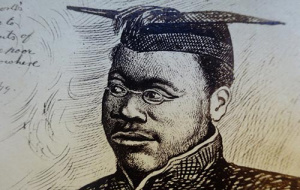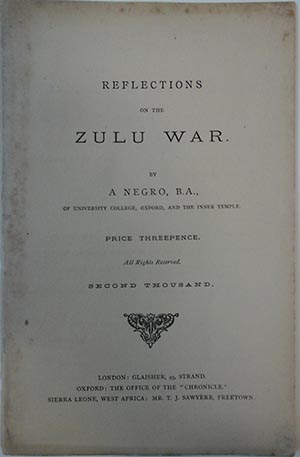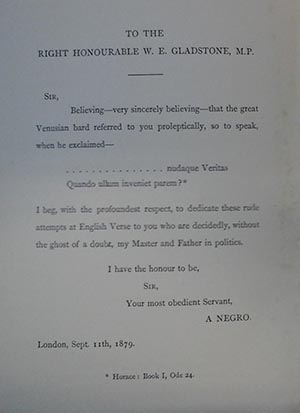Black History Month, 1879
 In Univ’s Library there is a pamphlet entitled Reflections on the Zulu War (fig. 1) which contains a poem by Christian Cole (1851/2-1885), a Sierra-Leonean, who in 1876 became the first Black African to take a degree from Oxford University.
In Univ’s Library there is a pamphlet entitled Reflections on the Zulu War (fig. 1) which contains a poem by Christian Cole (1851/2-1885), a Sierra-Leonean, who in 1876 became the first Black African to take a degree from Oxford University.
Cole studied as a non-collegiate student, meaning he did not have a college affiliation as an undergraduate. After graduating he was made a member of Univ in 1877. Given Cole’s association with the College it is highly appropriate that we have one of only two known copies of this edition of the pamphlet. It is also significant because the story of its creation and early reception helps us to understand better the ways in which Black History in Britain was unfolding 141 years ago.

Fig. 1 Title page of Reflections on the Zulu War (University College Library, KCA/COL)
Written in September 1879 and published anonymously, it contains a 19-stanza poem which begins with the lines:
Some white men of England,
Believe they alone
Are the people on earth, and
The rest are unknown.
This is a reference to the Anglo-Zulu War, fought during 1879 between British imperial forces and the Zulu Army led by King Cetshwayo kaMpande. The British pretext for the war was to unseat Cetshwayo, necessary to make possible the realisation of a British confederation in South Africa. The war itself had disastrous humanitarian consequences, which continued with the subsequent partition of Zululand.
The pamphlet was dedicated to WE Gladstone (1809-98) (fig. 2), who had used the Zulu War as a line of attack in his famous “Midlothian Campaign” against Benjamin Disraeli’s Tory government. In a speech outlining his imperial foreign policy which favoured peace rather than war, Gladstone supported the Zulu people for defending themselves against unnecessary military intervention by the British.

Fig. 2 Dedication to W.E. Gladstone in Reflections on the Zulu War (University College Library, KCA/COL)
In Reflections Cole set out a critique of the racial superiority inherent in the Victorian morality which was used to justify imperial military campaigns such as the one against the Zulu people:
Some white men of England
Have always believed
They will rule every land;
But—they are deceived.
They preach always of peace,
But revel in war,
When they are in bliss,
To others they’re sore.
At least two thousand copies were printed and circulated around Oxford, London, and Freetown, Sierra Leone. Except for a printed review in Oxford, little is known of the impression it made. Reflections was reviewed in the 23 October 1879 issue of the Oxford and Cambridge Undergraduate’s Journal where it was described as “distorted”, “mis-written”, “vulgar” and “unintelligible”, and fun poked at the faulty rhyming and defective metre. The reviewer completely ignored the issue Cole was raising.
Does this show that Cole had made a point about the lack of willingness in some quarters to confront and engage with the consequences of Britain’s overseas imperial activities? The following week’s edition carried a letter J Renner Maxwell, a fellow Sierra Leonean studying at Oxford who did not offer any solidarity with Cole. Maxwell distanced himself from the views expressed in Reflections dismissing it as being of no help to the African struggle for self-determination. Placed alongside was a defiant letter from Cole who not only identified himself as the author, but also promised another pamphlet to be entitled, “My reply to my Critics”.
Did Cole ever publish or make a reply? That is another story and chapter in Cole’s life, but the background to the creation and afterlife of Reflections shows how events (such as the Zulu War) in remote parts of the British Empire were thought about and debated in Britain, particularly within in the resident Black community of the time. Using the example of the Zulu War, Cole highlighted the disconnect between the ways in which the British Empire was (or was not) thought about in Britain, and the actual experience of Indigenous people in Britain’s colonies. Britain was the sum of its whole empire and the closing lines of Cole’s poem tell us how he thought the imperial power ought to view all its subjects:
While we live, let us ever
Be kind to our kin;
Let us love one another,
Through thick and through thin:
Let us never be jealous;
Let every one know
That one GOD hath made us
Who live here below.
Published: 6 October 2020
Further selected Univ Treasures are detailed below or explore the whole collection on our News and Features Treasures pages.
